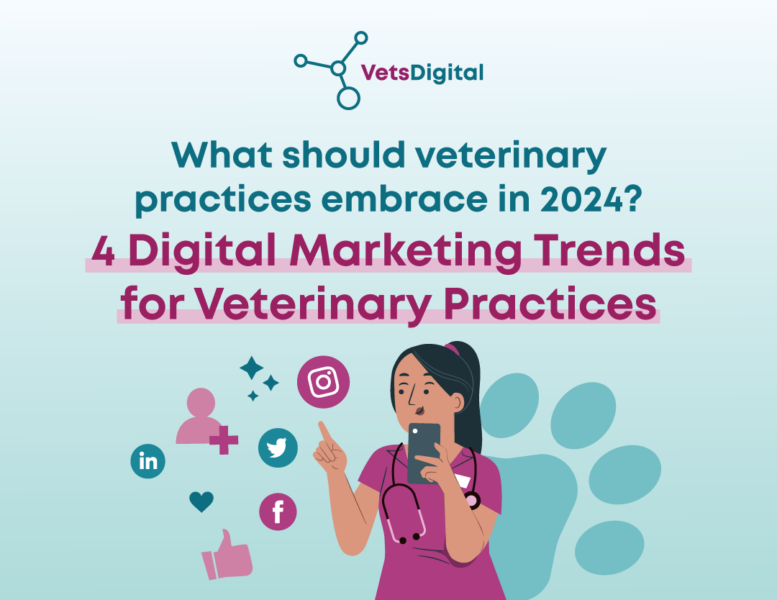Digital Marketing, News, Online Advertising,
What should veterinary practices embrace in 2024? 4 Digital Marketing Trends for Veterinary Practices.
As we enter 2024, it is essential that veterinary practices optimise their digital marketing efforts. New trends and technologies are always emerging, which means that digital marketers and veterinary practice owners must always be prepared to devise and adopt new strategies to capture and retain their ideal clients. The following are some key elements to help achieve this during 2024.

1. Content Planning
To stand out online and ensure that your practice maintains an authoritative position, you need to publish regular content showcasing your expertise and providing pet parents with the high-quality information and advice they seek. The only way to do this successfully is to plan your content methodically.
Content calendars are essentially schedules that mark where and when you plan to share content. The most effective content calendars include everything from promotional events in practice to making fresh updates to content that already exists on your website in order to improve its relevance, authority and accuracy (for SEO!).
We also recommend ensuring that your content calendar is populated with key dates relating to your business, including local events and animal awareness days that can be used as jumping-off points to create engaging content for your audience.
A content calendar is an inherently shareable document that everyone in the practice can refer to at any time. It may even be helpful to refer to your content calendar as a project management tool, as it can be used to document projects and processes as well as to highlight key dates that shouldn’t be overlooked.
When you can see exactly what is planned for the next week, month, or even six months, you will find it much easier to organise your schedule and ensure that you aren’t overwhelming your audience with too much of the same thing.
Collating all of the awareness days can be time consuming, but don’t worry, we’ve got your back for 2024- you can get your own copy of our new calendar here.
2. Personalised, Data-Driven Communications
Pet owners are becoming far more discerning when it comes to their spending, even for essential spending such as veterinary services. So, in order to successfully connect with your ideal audience, your practice needs to leverage the power of tailored marketing messaging. This will elevate the experience your pet owners have when engaging with your practice, increasing conversions and encouraging the bond between pet parent and practice.
It is important to focus on developing individualised experiences to meet the needs and appeal to your audience’s preferences. Targeted marketing messaging can be achieved in a range of different ways, including through personalised email marketing campaigns with personalised copy, offers and imagery that will resonate on an individual level. Using species specific segments of data, will help you speak to the right owners at the right time.
Numerous analytics solutions are available to practices, including those on mainstream social media, together with Google, Bing and niche search engines.
Analysing data can help you learn much more about your clients, including how to reach them, nurture them throughout their pet owning journey, and ensure they’re happy with the services you and your team are providing.
Analytics can be used to streamline your marketing reporting process, ensuring that real-time data can be used to make key strategic decisions moving forward. Everything from website traffic sources to social media platform reports can be factored in to help your digital marketing become more efficient and effective during 2024.
3. Contextual Advertising
You’re going to start hearing a lot more about the buzzword ‘contextual advertising’ from now on, so it’s worth getting to grips with it as soon as possible. Pet owners perceive this form of advertising in a more favourable light than many other forms of marketing. This is great news for practices like yours, as consumers are more likely to click on an ad they already believe has a connection with something they’re interested in.
Essentially, contextual advertising refers to an advert that appears on a page which is in some way relevant to the services your practice offers. Usually, they will also appear in the ‘sponsored’ section of a search engine results page (SERP) above the organic results.
Imagine someone is browsing a blog about pet health and nutrition. While reading an article about the best diets for dogs, an advert for your veterinary practice appears on the page. This advert might promote your practice’s expertise in pet nutrition or offer a discount for a first time health check for pets. Since the reader is already interested in pet health, they are more likely to notice and click on your advert, as it is directly relatable.
In this way, contextual advertising helps to place your veterinary practice in front of people who are already interested in pet care, making them more relevant and effective.
4. Video Advertising
The push towards video is something we’ve seen across all social platforms, and it’s not going to stop any time soon. It is highly impactful, so social platform algorithms are going to continue to make video content even more prominent in feeds.
For several reasons, video content tends to perform better in digital marketing, especially for veterinary practices. First, it’s inherently engaging and can quickly capture attention in a way that text or static images might not. Videos allow you to convey complex information, like pet care advice or veterinary procedures, in an easy to understand and visually appealing format. They also add a personal touch, showcasing your team and facilities, which all helps in building trust with pet owners.
And if you’re not on TikTok, now is the time to think about creating a presence there if you have the resources to commit to another social platform because its worldwide users are predicted to increase to more than 955 million by 2025 [1].






